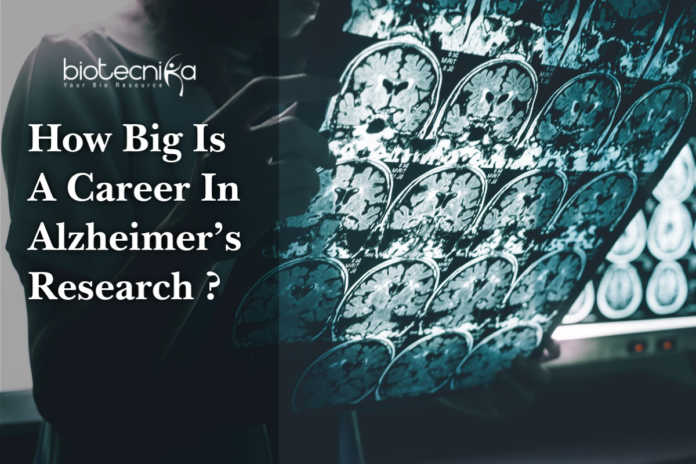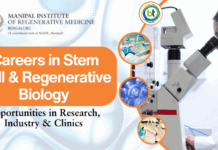Alzheimer’s Research Career
The recrudescence is upon us. It’s a very onerous thing for a patient to hear that nothing is left for you, but that is the truthful retaliation. There is no disorder -modifying remedies for Alzheimer’s.
Alzheimer’s disease known as Alzheimer’s only is an accelerating disorder that leads to the degeneration of brain cells, and they finally die. Alzheimer’s disease is the most customary root of dementia: a condition that is associated with a constant decline in thinking, behavioral, and social skills that disrupts a person’s ability to function independently. Memory loss is one of the earliest symptoms or signs of Alzheimer’s that include forgetting current incidents. As the disease progresses, acute memory impairment and loss of ability to carry out everyday tasks develop. This is an irreversible, continuous developing brain disorder destroying the ability of a patient to carry out the easiest piece of work.
This disorder is ranked as the 6th leading cause of death in various parts of the world; however, some recent research states that Alzheimer’s can reach the third rank following heart disease and cancer as it is the most common cause of death for older age group people. This disorder was named
after Dr. Alois Alzheimer who discovered the reason behind the death of a woman due to unusual mental illness. He observed changes in her brain tissues, various abnormal clumps/amyloid plaques were noticed in addition to tangles.Various groups of Scientists are under the research process to find out the actual cure or therapy for this type of disorder. The number of people pursuing a Career in Alzheimer’s Research is expected to increase in a few years. Alzheimer’s Research is one of the most upcoming fields of research as there is no such therapy discovered to date for this disorder, and it is clear that this disorder is responsible for the deaths of most of the older people.
Available medications for this disorder can only slow down the rate of diminishing or can improve the symptoms for a shorter period of time. Different Schemes and Facilities are available to support people with Alzheimer’s disorder and their custodians. No therapeutics cures Alzheimer’s disease or reform the disease operations in the brain. In advanced levels of the disorder, death is the final outcome due to vivid impediments from severe loss of brain function — like malnutrition, infection, or dehydration.
Alzheimer’s disease locks all the doors and exits. There is no reprieve, no escape!
Symptoms and signs associated with Alzheimer’s:
Before talking about Alzheimer’s Research Career, we must understand in-depth about this condition. The most prominent symptom of this disorder is Memory loss. Initially, the patient finds difficulty remembering or recalling recent events or various conversations. With the progression of the disorder, memory disfigurement worsens, and other symptoms associated with the disorder develop. There are certain changes linked with Alzheimer’s that lead to growing misfortune with time. Other signs and symptoms of Alzheimer’s include abnormalities in,
- Thinking and reasoning
- Making judgments and decisions
- Planning and performing familiar tasks
- Changes in personality and behavior
- Preserved skills
Types of Alzheimer’s :
Mild Alzheimer’s Disease:
With the progression of the disorder, memory loss becomes severe, and people experience other related cognitive complexities. This condition is characterized by various symptoms or problems like getting lost and strolling, repeating questions, trouble paying bills and handling money, taking longer to manage normal daily tasks, and behavior and personality changes. People are often diagnosed in this stage.
Moderate Alzheimer’s Disease:
In this type of Alzheimer’s, the areas of the brain are damaged that control sensory processing, reasoning, language, and conscious thought. Memory loss and confusion grow worse among the patients and tend to have trouble recognizing family and friends. They might develop difficulty in learning new things, carry out multi-step tasks like getting dressed, adjust to new situations. In addition, people at this stage may have paranoia, hallucinations, and delusions and may behave impulsively.
Severe Alzheimer’s Disease :
Ultimately, plaques and tangles spread throughout the brain, and brain tissue shrinks significantly. People with severe Alzheimer’s cannot communicate and are completely dependent on others for their care. Near the end, the person may be in bed most or all of the time as the body shuts down.
Alzheimer’s Research / Alzheimer’s Research Career:
As it has been thought that there is no treatment for Alzheimer’s disease, some researchers are continuously working on finding out therapy to cure this disorder somehow.
Biochemists discover new insights into what may go awry in the brains of Alzheimer’s patients
There have been more than three decades of Alzheimer’s Research that haven’t lead to any significant advancement in the treatment of this disorder. A distinguished Professor of Biochemistry and Chemistry Steven Clarke said that ‘Nothing has worked till now, but we’re ready for new ideas.’ Recently, in 2019, some researchers have reported various new perceptions that may lead to development and advancements in fighting against this catastrophic disease. Scientists and Researchers identified beta-amyloid, the small peptide that plays a crucial role in Alzheimer’s disease. Beta-amyloid was thought to be less harmful according to the previous data, but the age-damaged version of beta-amyloid is highly dangerous.
Researchers have identified a number of interest regions in the genome, which may lead to an increase in the risk of a patient for late-onset Alzheimer’s to varying degrees. Recent research studies in Alzheimer’s suggest that some genetic components are responsible for changes or modifications that occur during Alzheimer’s disease. Researchers believed that people with Down’s syndrome develop this type of disorder, the reasons given for such a hypothesis is that Down syndrome individuals have an extra copy of chromosome 21 containing the harmful amyloid producing genes.
Various groups of populations for rapid recognition, disease course prognosis, and intercedings in Alzheimer’s are a significant focus of current research. SCD- Subjective cognitive decline has evolved as a pre-mild cognitive impairment (pre-MCI) at higher risk circumstances of cognitive decline and dementia. Vivid groups of the forum are laid for the cure of this disease, such as Alzheimer’s Research and Therapy.
It is focussed on the various clinical trials, scientific studies on brain research with some translations studies. These researches are making a huge contribution to drug discovery and its expansion, including epidemiologic learning. Researchers have found out a process called Brain Resilience, the process of adjusting well in all the major sources of stress, such as Neurodegenerative conditions or biological aging, including Alzheimer’s pathology. Brain Resilience is a kind of thematic series that furnishes a comprehensive perspective of various factors that contribute to brain resilience and its effects on brain function and its health.
Continuously since the last few years, Alzheimer’s is the center of attraction for most of the scientists. They are doing research to find out the reasons behind this disorder and how this can be diminished or eliminated completely. If you are interested in Brain, its function, and how Alzheimer’s is caused due to change in shape and size of the Brain, you can give your contribution to Alzheimer’s research by being a part of its treatment or therapy. There are so many career options in Brain Research.
Alzheimer’s Research Career: Scope & Job Prospects
Alzheimer’s research has developed to a point where scientists are exploring ways to delay or prevent the disease as well as treat its symptoms. In ongoing clinical trials supported by NIA, scientists are developing and testing several possible interventions. Understudy are drug therapies aimed at a variety of targets, including the beta-amyloid protein, cerebrovascular function, loss of synapses, and specific neurotransmitters, as well as nondrug interventions, such as physical activity, diet, cognitive training, and combinations of these approaches. Today, the job market offers a vast variety of career opportunities for those who are interested in research.
Do you want to see yourself as a scientist or as a researcher working towards the treatment for one of the world’s most dangerous disorders, Alzheimer’s?
It can be hard to know how and where to start. You must be confused about whether to go for higher education or not.
How to begin your Alzheimer’s Research Career?
Earn a Bachelor’s degree
The first step towards an Alzheimer’s Research Career/ career in Alzheimer’s earning a bachelor’s degree in biology. There are many research-oriented institutes in India as well as abroad that will nurture student’s research interests along with the studies. This introduces the student to the research world.
Earn a Masters degree
Most of the research institutes or companies demand more than just a bachelor’s degree. A Master’s degree in any field biology can take up to three years to complete. The coursework during the two years usually consists of a research project in the field you are interested in, which can take six months to one year to complete.
Pursue a Doctoral Degree or Get Research experience
A doctoral degree or research experience in Alzheimer’s will clear your path to become a scientist or a researcher – to make a career in Alzheimer’s Research. Many universities, institutes in India as well as foreign nations like the US, Europe, offer doctoral programs in Alzheimer’s. Students are provided with the opportunity of independent research and teaching assistantship that prepares them for their further career.
Once you have obtained the required research experience or a Ph.D., you can apply for the various job opportunities in Alzheimers like;
- Clinical Research Associate
- Research Assistant
- Research Scientist
- Research Specialist
Alzheimer’s Research Career: Eligibility
Clinical Research Associate, Research Assistant, and Research Specialist generally require the following qualifications and skills.
- Postgraduate in Biology or Life Science
- Strong verbal and written communication skills
- Ability to read and understand medical/scientific journals
- Prior experience in research
For Alzheimer’s Research Career – A Research Scientist requires a doctoral degree in the related topic with research publications in top scientific journals.
Top Alzheimer’s Research laboratories in India
- Center for Brain Research – IISC Banglore
- NIMHANS – National Institute of Mental Health and Neurosciences
- National Center for Biological Sciences- NCBS Banglore
Top Alzheimer’s Research laboratories in World
- Harvard University
- Mayo Clinic and Mayo Foundation
- The University of California- San Diego
- John Hopkins University
- University California – Los Angels
- Washington University
- University of Penn
- National University on Aging
Top companies in the world recruiting Alzheimer’s Researchers
- Merck and Co.
- Asuragen. Inc
- Cambridge Cognition
- Neurotrack
- Denali Therapeutics & Many More
How Promising Is A Career in Alzheimer’s Research?
Alzheimer’s is the most common cause of dementia in the world. Being the 6th leading cause of death, Alzheimer’s has become the “hot topic” for researchers all over the world. Even after 50 years of extensive research, Alzheimer’s is still an incurable disorder. Over the past few years, science has grown immensely with the discovery of many technologies like CRISPR, biomarkers, etc.
The advancements in research techniques have given scientists new hope for developing effective treatments for Alzheimer’s. This calls for the requirement of many more researchers in the field of Alzheimer’s. The scope for career opportunities in this field is not just restricted to academia but is spread in industries also.
 medalist & has been honored by former President of India Pranab Mukherjee in 2013. She is currently associated with Biotecnika as an Academic Support Specialist. She has published 3 Research Articles, 5 Research Papers and 1 Book Chapter in various National & International scientific journals. She is very passionate about teaching and loves to guide and inspire her students. She is very optimistic, organized, active and enjoys working with a wide variety of people to achieve a common goal efficiently and realistically.
medalist & has been honored by former President of India Pranab Mukherjee in 2013. She is currently associated with Biotecnika as an Academic Support Specialist. She has published 3 Research Articles, 5 Research Papers and 1 Book Chapter in various National & International scientific journals. She is very passionate about teaching and loves to guide and inspire her students. She is very optimistic, organized, active and enjoys working with a wide variety of people to achieve a common goal efficiently and realistically. Co-Author: Namitha Thampi






































